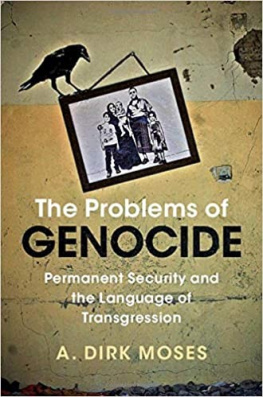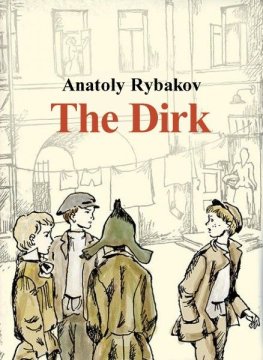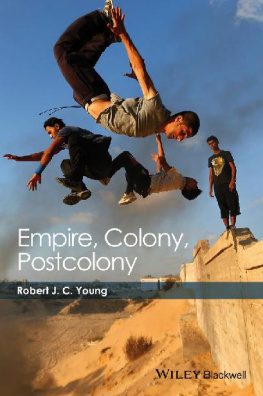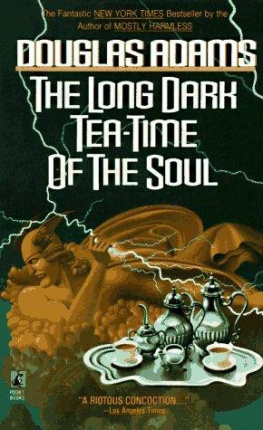A. Dirk Moses - Empire, Colony, Genocide
Here you can read online A. Dirk Moses - Empire, Colony, Genocide full text of the book (entire story) in english for free. Download pdf and epub, get meaning, cover and reviews about this ebook. year: 2008, publisher: Berghahn Books, genre: Politics. Description of the work, (preface) as well as reviews are available. Best literature library LitArk.com created for fans of good reading and offers a wide selection of genres:
Romance novel
Science fiction
Adventure
Detective
Science
History
Home and family
Prose
Art
Politics
Computer
Non-fiction
Religion
Business
Children
Humor
Choose a favorite category and find really read worthwhile books. Enjoy immersion in the world of imagination, feel the emotions of the characters or learn something new for yourself, make an fascinating discovery.

- Book:Empire, Colony, Genocide
- Author:
- Publisher:Berghahn Books
- Genre:
- Year:2008
- Rating:3 / 5
- Favourites:Add to favourites
- Your mark:
- 60
- 1
- 2
- 3
- 4
- 5
Empire, Colony, Genocide: summary, description and annotation
We offer to read an annotation, description, summary or preface (depends on what the author of the book "Empire, Colony, Genocide" wrote himself). If you haven't found the necessary information about the book — write in the comments, we will try to find it.
Empire, Colony, Genocide — read online for free the complete book (whole text) full work
Below is the text of the book, divided by pages. System saving the place of the last page read, allows you to conveniently read the book "Empire, Colony, Genocide" online for free, without having to search again every time where you left off. Put a bookmark, and you can go to the page where you finished reading at any time.
Font size:
Interval:
Bookmark:
Studies on War and Genocide
General Editors: Omer Bartov, Brown University and A. Dirk Moses, University of Sydney
Volume 1
The Massacre in History
Edited by Mark Levene and Penny Roberts
Volume 2
National Socialist Extermination Policies: Contemporary German Perspectives and Controversies
Edited by Ulrich Herbert
Volume 3
War of Extermination: The German Military in World War II, 1941/44
Edited by Hannes Heer and Klaus Naumann
Volume 4
In God's Name: Genocide and Religion in the Twentieth Century
Edited by Omer Bartov and Phyllis Mack
Volume 5
Hitler's War in the East, 1941-1945
Rolf-Dieter Mller and Gerd R. Ueberschr
Volume 6
Genocide and Settler Society: Frontier Violence and Stolen Indigenous Children in Australian History
Edited by A. Dirk Moses
Volume 7
Networks of Nazi Persecution: Bureaucracy, Business, and the Organization of the Holocaust
Edited by Gerald D. Feldman and Wolfgang Seibel
Volume 8
Gray Zones: Ambiguity and Compromise in the Holocaust and Its Aftermath
Edited by Jonathan Petropoulos and John K. Roth
Volume 9
Robbery and Restitution: The Conflict over Jewish Property in Europe
Edited by M. Dean, C. Goschler and P. Ther
Volume 10
Exploitation, Resettlement, Mass Murder: Political and Economic Planning for German Occupation Policy in the Soviet Union, 1940-1941
Alex J. Kay
Volume 12
Empire, Colony, Genocide: Conquest, Occupation, and Subaltern Resistance in World History
Edited by A. Dirk Moses
Volume 13
The Train Journey: Transit, Captivity, and Witnessing in the Holocaust
Simone Gigliotti
Volume 14
The Final Solution in Riga: Exploitation and Annihilation, 1941-1944
Andrej Angrick and Peter Klein
EMPIRE , COLONY , GENOCIDE
Conquest, Occupation, and
Subaltern Resistance in World History
Edited by
A. Dirk Moses

First published in 2008 by
Berghahn Books
www.berghahnbooks.com
2008, 2010 A. Dirk Moses
First paperback edition published in 2010
First ebook edition published in 2014
All rights reserved. Except for the quotation of short passages for
the purposes of criticism and review, no part of this book may be
reproduced in any form or by any means, electronic or mechanical,
including photocopying, recording, or any information storage and
retrieval system now known or to be invented, without written
permission of the publisher.
Library of Congress Cataloging-in-Publication Data
Empire, colony, genocide : conquest, occupation, and subaltern
resistance in world history / edited by A. Dirk Moses.
p. cm. (Studies on war and genocide ; v. 12)
Includes bibliographical references.
ISBN 978-1-84545-452-4 (hardback : alk. paper) -- ISBN 978-1-84545-719-8 (paperback) -- ISBN 978-1-78238-214-0 (ebook) 1. Genocide
History. 2. Crimes against humanityHistory. I. Moses, A. Dirk.
HV6322.7.E46 2008
364.15'1dc22 2008008207
British Library Cataloguing in Publication Data
A catalogue record for this book is available from the British Library.
ISBN 978-1-84545-452-4 hardback
ISBN 978-1-84545-719-8 paperback
ISBN 978-1-78238-214-0 ebook
CONTENTS
PREFACE
T his book was inspired by a conference called Genocide and Colonialism that I hosted at the University of Sydney in July 2003. The conference was, as far as I can determine, the first held on this topic. Eight of the chapters published here first saw the light of day on that occasion, while two of the papers from the conference were published elsewhere: Michael Rothberg, The Work of Testimony in the Age of Decolonization: Chronicle of a Summer, Cinema Verit, and the Emergence of the Holocaust Survivor, PMLA 119, no. 5 (2004): 1231-46; and Norbert Finzsch, 'It is Scarcely Possible to Believe that Human Beings could be so Hideous and Loathsome': Discourses of Genocide in Eighteenth- and Nineteenth-century America and Australia, Patterns of Prejudice 39, no. 2 (2005): 97-116 (reprinted in A. Dirk Moses and Dan Stone, eds., Colonialism and Genocide [London: Routledge, 2007]). I commissioned the balance of the chapters in order to cover as much of the globe as possible.
Even with nineteen chapters, of course, the book only scratches the surface of world history. No claim to comprehensiveness is made. Empire, Colony, Genocide presents case studies of genocide in colonial and imperial contexts in order to stimulate an underrepresented research agenda in the field of genocide studies. To date, the field has been dominated by social scientists who, understandably enough, rely on secondary literature and focus on the twentieth century. The authors in this book are overwhelmingly historians of the early modern and modern periods with detailed knowledge of the archival sources in their area of research. By embedding their empirical expertise in the transnational approach of comparative colonialism and genocide studies, as well as uncovering the colonial roots of the genocide concept itself, they are trying to operationalize Raphael Lemkin's original but ignored insight that genocides are intrinsically colonial and that they long precede the twentieth century. The history of genocide is the history of human society since antiquity.
Although most of the cases studied here cover European encounters with non-Europeans, it is not the intention of the book to give the impression that genocide is a function of European colonialism and imperialism alone. Lemkin himself was interested in many cases, such as the Athenian, Roman, Mongol, and Ottoman empires. We hope to revive interest in his research program and humanitarian view of world history.
No book like this can be produced without the help of friends, colleagues, and institutions. The Humanities Research Centre and the Herbert and Valmae Freilich Foundation at the Australian National University sponsored and largely financed the conference. The School of Philosophical and Historical Inquiry and the Faculty of Arts at the University of Sydney also chipped in. Ann Curthoys and John Docker at the ANU encouraged me along the way, gave papers at the conference, and wrote chapters for this book. My colleagues in the Department of History were most supportive, particularly Robert Aldrich, Alison Bashford, Stephen Garton, and Richard Waterhouse.
I completed some of the work for this project as a Charles H. Revson Fellow at the Center for Advanced Holocaust Studies at the United States Holocaust Memorial Museum, and I am grateful to its staff for their assistance during my months in Washington, DC. The book was finalized while on teaching relief funded by the Australian Research Council (ARC), whose grant on genocide and colonialism allowed me to conduct broader research on this topic. Every Australian academic who has been given time to research and write thanks to ARC teaching relief is a model of productivity and gratitude. I am also indebted to Omer Bartov, the editor of the series in which this book appears, and to the publisher Marion Berghahn for supporting the project and consenting to late changes and endless delays with grace and good humor. Unfortunately, I cannot name the colleagues who acted as anonymous referees, but their erudition and professionalism needs to be acknowledged. My thanks are extended to Marianne Ehrhardt for preparing the index, and to Patrick Wolfe for advice on various matters.
Next pageFont size:
Interval:
Bookmark:
Similar books «Empire, Colony, Genocide»
Look at similar books to Empire, Colony, Genocide. We have selected literature similar in name and meaning in the hope of providing readers with more options to find new, interesting, not yet read works.
Discussion, reviews of the book Empire, Colony, Genocide and just readers' own opinions. Leave your comments, write what you think about the work, its meaning or the main characters. Specify what exactly you liked and what you didn't like, and why you think so.







